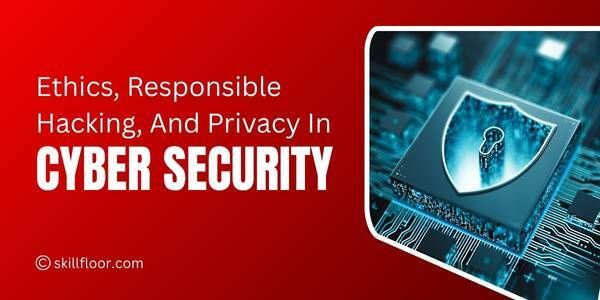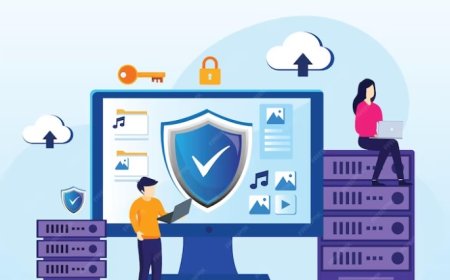Understanding Blockchain's Impact on Cybersecurity
Explore the profound impact of blockchain on cybersecurity. Learn how this revolutionary technology enhances data protection and secures digital transactions.

Blockchain is like a high-tech, super-secure ledger. Imagine it as a digital notebook that keeps records of transactions, but it's not stored in one place; it's spread out all over the world. This makes it tough for bad actors to tamper with the information. It's like having a record-keeper that everyone trusts.
Now, let's chat about cybersecurity. In our online lives, we share personal info and sensitive data. Cybersecurity is like a protective shield that keeps this info safe from hackers and cyber threats. You can think of it as your digital bodyguard.
Well, when you combine blockchain and cybersecurity, it's like having a super-shield for your data. Blockchain's decentralized and tamper-proof nature can beef up your digital security. So, understanding how these work together is crucial in our increasingly digital and interconnected world.
The complications and solutions when it comes to cybersecurity and blockchain.
Cybersecurity faces some big challenges. Most of our data and systems are stored in central places, like big digital vaults. These centralized systems can be vulnerable. Hackers can target one spot and cause a lot of damage, like a thief breaking into a single, important safe.
But here's where blockchain comes to the rescue. It's like a digital guard that doesn't have a single headquarters. Instead, it's spread out everywhere, like a neighborhood watch. This means that if a hacker tries to mess with the data in one place, they'd have to deal with everyone in the neighborhood, making it super tough for them to succeed.
Blockchain also makes sure that once data is added, it can't be easily changed or deleted. It's like writing in pen instead of a pencil; it's permanent. So, even if a cyber intruder gets in, they can't easily cover their tracks.
Another neat thing is how blockchain can help with identity and access control. Imagine you have a digital fingerprint that proves it's really you when you access your online accounts. Blockchain can securely store and manage these digital fingerprints, making it much harder for someone to impersonate you.
Traditional cybersecurity has its challenges, especially with centralized systems. But blockchain is like a superhero sidekick, adding an extra layer of security. It spreads data everywhere, keeps it tamper-proof, and helps verify who you really are in the digital world.
What is the impact of blockchain on cybersecurity?
Blockchain has a big impact on cybersecurity in several ways:
-
Tamper-Proof Protection: Blockchain makes it really hard for hackers to mess with data. Unlike regular systems that keep everything in one place, blockchain spreads data across lots of computers. Once something is added to the blockchain, it's almost impossible to change. It's like writing your name in wet cement – once it's there, it stays put.
-
Data Privacy: With blockchain, your personal info isn't kept in one spot, making it less tempting for cybercriminals. It's like scattering your valuables across different safes. Even if one gets broken into, the others stay safe.
-
Identity Verification: Blockchain helps prove who you are online. It can securely store digital fingerprints or ID data, making it really reliable. Think of it like having a digital passport that's tough to fake.
-
Access Control: Controlling who gets into certain info or systems is crucial for cybersecurity. Blockchain's smart contracts make sure only the right people get access. It's like having a digital gatekeeper.
-
Resilience to Attacks: Blockchain's setup makes it tough to take down. Unlike regular systems with weak points, blockchain is spread out. Even if one part is hacked, the rest stay safe. It's like playing Jenga where you can remove a few blocks, but the tower doesn't fall.
-
Transparency: All transactions on a blockchain are recorded for everyone to see. This might seem like it goes against privacy, but it adds a layer of security by making everything transparent. It's like having security cameras in a store – it discourages bad behavior and helps catch troublemakers.
-
Trust and Trustlessness: Blockchain builds trust through technology, not a central authority. Trust is created through the network's rules. This lack of needing to trust someone directly can be a game-changer where trust is hard to find. It's like trusting a stranger in a deal because you both follow the same unchangeable rules.
In simple terms, blockchain makes a big difference in cybersecurity. It tackles issues in regular systems by providing strong protection, improving privacy, verifying identity, controlling access, and standing strong against attacks. Its openness and trust-building features make it crucial in keeping our digital world safer.
Blockchain technology enhance cybersecurity measures effectively
So, while blockchain technology brings some great strengths to the table, it's not a magical solution that solves everything. It's like having a reliable lock on your door – it deters burglars, but you still need to be cautious.
Blockchain's decentralized and tamper-proof nature is indeed a significant advantage. It protects data from unauthorized access and tampering, acting like a trusty guard for your digital assets. But, and there's always a "but," we need to acknowledge that it's not flawless.
For instance, blockchain can be a bit slow and resource-intensive. It's like having a super secure safe, but it takes a bit longer to open compared to a regular one. It might not be the best fit for all types of data or applications. So, we can't rely solely on it; we still need other security measures in place.
Here's another thing to keep in mind – while blockchain ensures data is tamper-proof, it doesn't guarantee the accuracy of the initial data entered. It's like having a diary where you can't erase anything; if you write down the wrong thing initially, it stays there. So, we must be careful about what we put into the blockchain in the first place.
So, in the grand scheme of things, blockchain is a valuable addition to our cybersecurity toolkit. It's like having a new, powerful tool that complements the ones we've been using. When we combine traditional cybersecurity methods with blockchain technology, it's like having a supercharged security system at home – one that deters intruders and makes it challenging for them to break in.
In essence, while blockchain enhances our security, it's not the only solution. It's part of a larger strategy, like how you'd use multiple locks on your bike to make sure it's really secure. By understanding its strengths and limitations, we can use blockchain effectively to create a robust defense against cyber threats. It's about finding the right balance, like having the perfect mix of locks and alarms to keep our digital world safe and sound.
Blockchain's impact on cybersecurity plays out in the real world.
Real-World Scenarios: How Blockchain Strengthens Cybersecurity
-
Secure Online Shopping: Imagine you're shopping online, and you want to make sure your payment details are safe. Many online retailers and banks are turning to blockchain to amp up their cybersecurity. When you buy something, blockchain steps in to encrypt and securely store your payment information. This makes it really tough for cybercriminals to grab hold of your data and misuse it.
-
Protecting Healthcare Records: In healthcare, keeping patient records safe is a big deal. Traditional systems have faced data breaches, which is worrying. With blockchain, medical records get a super secure and transparent treatment. Your medical history and personal info stay safe from prying eyes. It also helps healthcare providers access your records quickly and accurately when needed, making patient care better.
-
Revolutionizing Supply Chain Security: Think about the journey a product takes from the manufacturer to you. It's a complicated process, but blockchain is changing the game in supply chain cybersecurity. Every step of a product's journey gets recorded on a blockchain, ensuring the goods' integrity. This not only cuts down the risk of fake products but also helps companies spot and fix any problems or recalls faster. It's like a digital stamp of trust on the things you buy.
-
Securing International Transactions: Sending money internationally can be nerve-wracking, right? Blockchain is stepping up in the financial world to make it more secure. It enables safe and almost instant cross-border transactions, ditching the need for middlemen. This not only saves time and money but also gives people and businesses more confidence in the financial system.
-
Protecting Government Records: In government and public records, blockchain is putting a shield around sensitive info. Take land registries, for example. They're using blockchain to make property records tamper-proof. This lowers the risk of property scams and disagreements, offering more security to property owners.
Blockchain's impact on cybersecurity goes beyond these examples. Different industries are exploring how it can beef up data security and shield against cyber threats. It's not just a techie concept – it's making our digital lives safer in very practical ways.
Blockchain is like a trusty sidekick in the world of digital security. It's spreading data all around, making it tough for cyber bad guys to do harm. It also keeps records secure and ensures that your digital identity is well-protected. Looking ahead, the future of blockchain and cybersecurity is bright. We'll likely see more industries adopting this technology to keep our data safe. As technology advances, so will the ways blockchain can help us stay secure in our increasingly digital lives. So, stay tuned for more exciting developments in this dynamic duo of technology and security!





























































